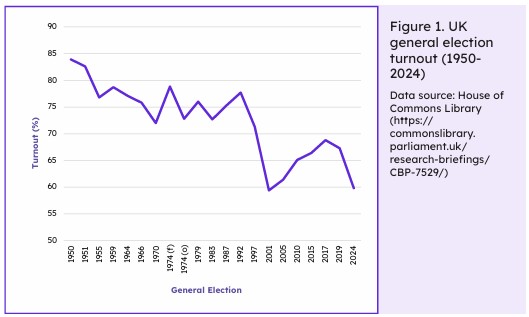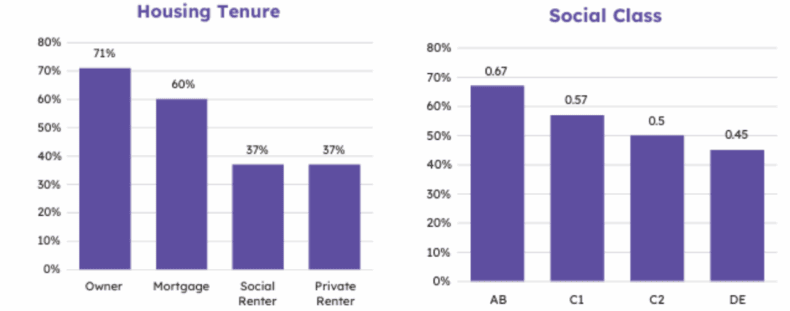A recent report by the Constitution Society highlights an important and concerning trend in British democracy: our elections are increasingly blighted by low turnout. In last year’s general election, more than four in 10 eligible voters didn’t cast a ballot.

.
This really matters, not just for democratic legitimacy, but because the disparity as to which groups actually bother to vote is creating warped incentives for governments. They feel obliged to prioritise the interests of highly-educated, wealthy, higher-turnout demographics over the left-behind in society. And they put the interests of pensioners, who vote in reliably high numbers, over those of the young, who are less inclined to make a trip to the polling station.
The report’s author David Klemperer draws attention to some interesting data from Ipsos: turnout at last year’s election for social grades AB was 22 points higher than for grades DE, and it was 36 points higher among outright homeowners than it was for private and social renters.
The report also refers back to ‘The New Politics of Class’ by Geoff Evans and James Tilley, a groundbreaking study which in 2017 highlighted declining rates of working-class turnout in UK general elections since the early 2000s, linked to the Labour Party’s increasing orientation towards the middle classes.
All this helps to explain why lower-income and working class citizens are more likely to distrust politicians, feel that democracy in the UK does not serve their interests or express deep reservations that political participation is effective.
With barely half of the population voting, political participation is losing its centrality to our civic order. Who could genuinely say they saw the 2024 election as a reflection of public sentiment, or as an effective means of ensuring that government and MPs were serving the interests of the whole population?
The problem of low turnout, as the report suggests, ‘risks trapping British politics in a spiral of stagnation and discontent, ultimately threatening the long-term health of our democracy’.
Youth voters are also losing faith in the democratic system itself – not one particular party, but the entire system. The post-war democratic settlement for many seems to have soured.
To counterbalance declining turnout, the report proposes the introduction of compulsory voting for UK general elections, enforced by a small fine. Meanwhile Angela Rayner and Keir Starmer have pinned their hopes on votes for 16 and 17 year olds. However disagreeable or contested, it is important to understand why they have done so. Their wish is to boost voter turnout as a percentage of registered voters, most notably among those who are poorer and less educated as well as younger.
Naturally, there will be some who say – don’t tinker with the engine, let the political system of parties (Reform UK? Liberal Democrats? Green Party?) spontaneously respond with new offers, new agendas – progressive or conservative – along with new candidates by naturally reflecting the diverse preferences of voters.
Or why not instead increase political literacy on the fundamental nature of voting at the time of elections in a democracy – better still, why not broadcast what it means to lack democratic choice and accountability for those under the rule of states like Russia or China?
Policy prescriptions aside, one is left thinking what civil society could do for itself to respond to declining turnout. The report is not silent on that vital issue. It notes for example that the countries where compulsory voting has worked most effectively – Belgium and Australia – have generated strong norms and habits of universal democratic participation.
In Australia, this operates through the famous ‘democracy sausage’. As the report explains, this involves: ‘community groups associated with schools, churches, or other local associations setting up fundraising barbecues and bake sales outside polling stations’. The author sums up how sausage sizzles ‘have become an established part of the ritual of voting in Australia, creating an atmosphere of civic celebration akin to a street party, and turning a legal obligation into something almost festive’.
So, what are we waiting for? Surely not the sausage. The British public eats more than 175,000 tonnes of sausages each year. A culture of festive participation would boost turnout in its own right. So why not pull out the ballot papers and stick the pan on high? Where the state has failed, civil society should be entrusted to save civic duty.
– the best pieces from CapX and across the web.
CapX depends on the generosity of its readers. If you value what we do, please consider making a donation.
Columns are the author’s own opinion and do not necessarily reflect the views of CapX.












